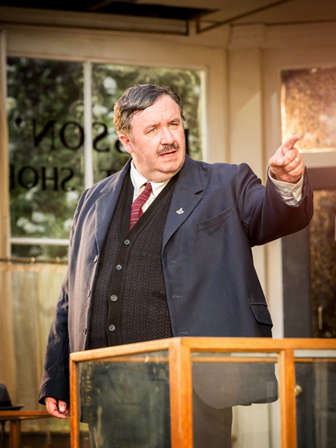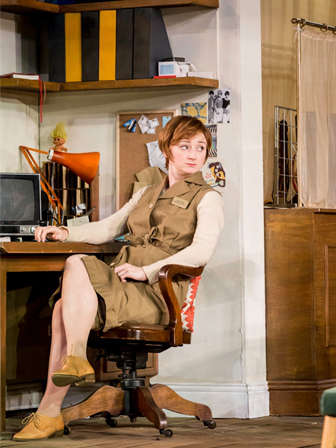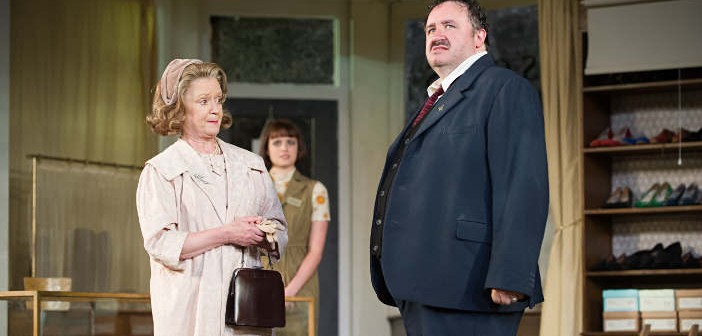Mark Benton is a funny guy. I don’t think he could help it if he tried. His infectiously buoyant presence is a delight to witness and only increases the novelty that already accompanies a trip to the Regent’s Park Open Air Theatre. But despite the intrinsic fun of clutching a glass of wine with a blanket across the knees, the wind whistling through the trees, Benton’s turn as Henry Horatio Hobson descends into a thoughtful, measured and unflatteringly honest portrayal of a self-made man who is also the master of his own destruction.
Harold Brighouse’s 1915 play, Hobson’s Choice, was originally set in the 1880s – an austere and socially restrictive time, when women were yet to discover the thrill of emancipation. Based in a Salford bootmaker’s, it tells the tale of Hobson, whose shop has always done well and daughters always obeyed him. But when they start to covet lives and lovers of their own, Hobson’s world – and business – fall apart. His only solace being the bottle, his life seems a tragic and frighteningly short prospect until the doctor suggests that all he might need is the guiding arm of his eldest, Maggie. Having worked unpaid and unthanked in the family business until recently setting up on her own, Maggie is only willing to return under her own terms: her father must go into business with her husband, who happens to be the shop’s lowly former apprentice.
 Hobson’s Choice was a term coined in the seventeenth century and referred to the misleading appearance of two options, when it’s really a ‘no choice at all’ situation; Hobson can either accept Maggie’s proposal for him to hand over his life’s work, and watch her and her hubby take the reins, or he can remain alone and unkempt, drinking himself into an early and very imminent grave.
Hobson’s Choice was a term coined in the seventeenth century and referred to the misleading appearance of two options, when it’s really a ‘no choice at all’ situation; Hobson can either accept Maggie’s proposal for him to hand over his life’s work, and watch her and her hubby take the reins, or he can remain alone and unkempt, drinking himself into an early and very imminent grave.
Ingenious director Nadia Fall has updated Brighouse’s work to the swinging Sixties. Although a markedly revolutionized time of social liberation compared to the original Victorian setting, it is still a point at which morals, opinions and opportunities remained starkly different from today. It’s also the time when perhaps the most significant alterations in social mores were taking place – the miniskirt, the pill, the acceptance of extra-marital relations and the gumption of women to go out, work, and choose their own lives and husbands. Things were changing but choices were still a far cry from what they are now. So it’s an incredibly interesting point at which to view this tale, sitting between where we were then and how things currently stand.
To start with, blundering old Hobson staggers onto the stage after an evening at his local, singing along to Frank Sinatra’s ‘My Way’. As the revolving set takes him home, the lights start to flash, the music ramps up, and Hobson becomes a glittering incarnation of the crooner. This is Benton at his twinkly-eyed best but then, as he falls through his shop’s front door, reality bites. The music was in his head, the spotlight a wild imagination, and he can barely slur the words, let alone sing them. His Rat Pack dancing was a far, wishful cry from the ham-fisted stumble. Hobson is a drunk and, come morning, his daughters have seen it all before. They talk to him as though he is a child because it’s the only way to deal with his behaviour, but he ultimately has them under the thumb because they are the ones who work for him, and he can – if he chooses – settle money on them, thus enabling them to marry. Except he doesn’t want to.
 Benton is both entertaining and heartbreaking as this sad figure. When he takes his belt to his daughter’s betrothed, he is genuinely fearsome. When he plods downstairs in his undergarments, bemoaning the solitariness that will compound his demise, one cannot help but feel distressed for him and Benton allows a candidly unattractive image to materialize.
Benton is both entertaining and heartbreaking as this sad figure. When he takes his belt to his daughter’s betrothed, he is genuinely fearsome. When he plods downstairs in his undergarments, bemoaning the solitariness that will compound his demise, one cannot help but feel distressed for him and Benton allows a candidly unattractive image to materialize.
The utterly brilliant Jodie McNee plays Maggie, an apt combatant for her father and the only capable one. She decides that she must marry the talented apprentice, Willy Mossup, so that they can start up a business on their own and escape her controlling father’s clutches. She is 30 and supposedly off-the-shelf, doomed for spinsterhood, but having managed the books for years, she knows what’s what, and Willy is her ticket to a better life. It is mildly disturbing the way that she all but clobbers the young, timid and impressionable Willy round the ears to get him to agree to marry her, but you have to admire her determination. McNee is dry and forceful and gives Maggie a convincing air of vulnerability which allows the audience to understand her predicament.
The trembling Karl Davies is an ideal Willy Mossup, who has never dreamed of anything other than diligently plugging away at his trade and not questioning his boss, nor life’s lot. His ambition is all Maggie’s but, when she has worked her magic, Davies’ peacock strut into Hobson’s shop is done with a cleverly hollow bravado, which regresses into a juvenile disbelief at his own courage once the old man’s back is turned.
There is a strong supporting cast, who take this story to a place of Northern repression mixed with Sixties verve, and it is lovely to see Joanna David as the wealthy patron Mrs Hepworth (aka the fairy godmother). Given that the men are expressing Victorian opinions whilst wearing Sixties suits, their archaic views of women border on the misogynistic but, for the most part, this is an inspired way of relaying Brighouse’s work. Dramatic, fun and exceedingly well-acted, Hobson’s Choice is definitely one to be enjoyed.
Hobson’s Choice at the Regent’s Park Open Air Theatre until 12th July 2014. Running time approximately 2 hours 25 minutes including an interval. For more information and tickets visit the website.




